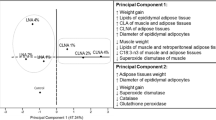Abstract
The effect of seed oil of Korean pine (Pinus koraiensis) on the rats’ blood-fat and its anti-ageing function was studied for appraising the efficacy of the seed oil of Korean pine. Sixty experimental rats were randomly divided into 5 groups (half males and half females in each group) as normal control group, high fat diet control group, and three groups (Group 1 Group 2, Group 3) that were fed with feedstuff with the contents of the seed oil of 2.0g/(kg·d−1), 4.0g/(kg·d−1) and 8.0g/(kg·d−1), respectively. The indexes such as superoxide dismutase (SOD), glutathione peroxidase (GSH-PX) and anti-oxidation capacity (AOC) were measured by Reagent Kit method. It was found that the seed oil of the Korean pine could reduce the content of triglyceride and improve SOD as well as GSH-PX activity in serum. These indexes of the rats in Group 2 fed with Korean pine seed oil of 4.0 g/(kg·d−1) reached the significant level and those of rats in Group 3 fed with the seed oil of 8.0 g/(kg·d−1) reached the extremely significant level. The results indicated the seed oil of Korean pine had function of regulating the level of blood-fat and anti-ageing.
Similar content being viewed by others
References
Chen Rendun. 2001. Rich nutrients [M]. Beijing: China Light Industry Press, p520–588. (in Chinese)
Chinese Nutrition Society. 2001. Chinese Dietary Reference Intake [M]. Beijing: China Light Industry Press, p56–102. (in Chinese)
Guo Ying, Cai Xiucheng, Li Huajuanet al. 1996. Effect of perilla and pinion oil on lipid and lipid peroxidation in rats [J]. Acta Nutrimenta Sinica,18(3): 268–273. (in Chinese)
Guo Ying, Cai Xiucheng, Zhao Xiaoyan, Sun Lianyinget al. 2001. Effects of five vegetable seed oil on serum lipid and lipid peroxidation in rats [J]. Journal of Hygiene Research,30(1): 50–52. (in Chinese)
Rao Guohua, Chen Jinping & Wang Jun. 2002. Study on rinding technology of pignut [J]. Journal of Food Science,23(8): 169–172. (in Chinese)
Wang Xiaochun, Long Su, Xu Keqianet al. 2002. The scavenging effect of Cheqian weed on oxygen free radical [J]. Practical Preventive Medicine,9(2): 139–140. (in Chinese)
Yu Junlin, Che Xiquan & Chang Jiqing. 2001. Chemical compositions and function of pine kernel [J]. Renshen Yanjiu,13(1): 25–27. (in Chinese)
Yue Hong, Hu Xiaoling, Guan Pinget al. 1999. Nutritive value and healthful drinking research on Juglans rigia and pinut [J]. Science and Technology of Foods,1(2): 37–39. (in Chinese)
Zhao Keran, Yang Yijun & Cao Daojun. 2000. Oxygen free radical and clinic [M]. Beijing: China Science and Technology of Medicament Press, p70. (in Chinese)
Author information
Authors and Affiliations
Additional information
Biography: WANG Zhen-yu (1957-), male, Prof. in Forestry College, Northeast Forestry University, Harbin 150040, P. R. China.
Responsible editor: Zhu Hong
Rights and permissions
About this article
Cite this article
Wang, Zy., Chen, Xq. Functional evaluation for effective compositions in seed oil of Korean pine. J. of For. Res. 15, 215–217 (2004). https://doi.org/10.1007/BF02911028
Received:
Issue Date:
DOI: https://doi.org/10.1007/BF02911028




